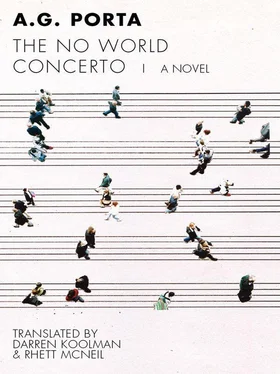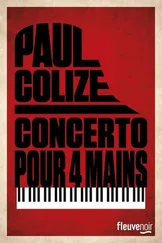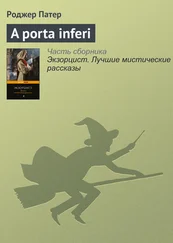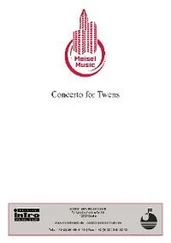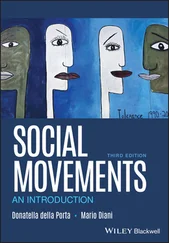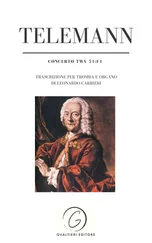A. Porta - No World Concerto
Здесь есть возможность читать онлайн «A. Porta - No World Concerto» весь текст электронной книги совершенно бесплатно (целиком полную версию без сокращений). В некоторых случаях можно слушать аудио, скачать через торрент в формате fb2 и присутствует краткое содержание. Год выпуска: 2013, Издательство: Dalkey Archive Press, Жанр: Современная проза, на английском языке. Описание произведения, (предисловие) а так же отзывы посетителей доступны на портале библиотеки ЛибКат.
- Название:No World Concerto
- Автор:
- Издательство:Dalkey Archive Press
- Жанр:
- Год:2013
- ISBN:нет данных
- Рейтинг книги:4 / 5. Голосов: 1
-
Избранное:Добавить в избранное
- Отзывы:
-
Ваша оценка:
- 80
- 1
- 2
- 3
- 4
- 5
No World Concerto: краткое содержание, описание и аннотация
Предлагаем к чтению аннотацию, описание, краткое содержание или предисловие (зависит от того, что написал сам автор книги «No World Concerto»). Если вы не нашли необходимую информацию о книге — напишите в комментариях, мы постараемся отыскать её.
, Vila-Matas's
, and Marías's
is a many-layered puzzle concerning an old screenwriter who has holed up in a shabby hotel in a never-named but familiar city in order to write a script about his lover — a young piano prodigy who wants in turn to give up music and become a novelist, and who believes she may be in contact with creatures from another world. Ambition, lust, hate, and the need to create all combine to make up a potent depiction of youth — and age — lost in a labyrinth of their own making.
Sinister and erotic, shifting restlessly between realities, and populated by conspirators both real and imagined,
is an investigation of the limits of language, storytelling, and the known world, set against a backdrop of empty concert halls and hazy foosball bars. It is the first of A. G. Porta's books to appear in English, finally joining those of his early writing partner and devotee Roberto Bolaño.
No World Concerto — читать онлайн бесплатно полную книгу (весь текст) целиком
Ниже представлен текст книги, разбитый по страницам. Система сохранения места последней прочитанной страницы, позволяет с удобством читать онлайн бесплатно книгу «No World Concerto», без необходимости каждый раз заново искать на чём Вы остановились. Поставьте закладку, и сможете в любой момент перейти на страницу, на которой закончили чтение.
Интервал:
Закладка:
Late in the morning, the screenwriter is still asleep. He drank too much, and went to bed late, immersed as he was in the drafts of some scenes, bothered by the second act during which the audience is bound to yawn with boredom, because the story starts lagging, digressing, which will give them the impression the writer has lost the plot. On awakening, he feels confused, and decides to stay in bed and kill some more time in the curtained gloom. Sundays are strange, he muses with displeasure; he’d rather it was any other day but Sunday. When he finally gets up, he drains the half bottle of water he left in the fridge, then gets ready to go out and look for a place to have breakfast. He buys a newspaper at a kiosk where the boulevards intersect, and then limps to the café, with the help of his cane. Once seated on the terrace, he looks around for the waitress who often serves him, but he remembers she doesn’t work on Sundays. Her replacement is an older woman, possibly an acquaintance of the owner. It could be the owner herself, as she’s not wearing a uniform, although the way people dress nowadays, you never can tell. After going over the headlines, he folds the newspaper and leaves it on the table, puts away his glasses, and waits for someone to serve him. Once his coffee arrives, he lights a cigarette and tries to focus on his script. But he’s too distracted by all the movement and noise around him, so he ends up just watching the people strolling around the plaza — seeing them as if through a mist, going about their business — some leisurely, others dutifully, their attitude made plain by their expression and gait, their business remaining a mystery. In the neighboring country’s capital, the women are beautiful, and the screenwriter thinks they have a characteristic style of makeup and dress. Of course, the black prostitute is an exception. But, then, although this may be her native city, her roots are in the former colonies. The screenwriter seems noticeably relaxed, his breathing slow, regular; or, depending on how you see it, labored, sluggish — for he may be too relaxed, he may even be at the point of sleep. He likes the black prostitute because she doesn’t wear makeup. He hadn’t thought about it before. He likes her for other reasons too, but this one never occurred to him. Without makeup, a face seems clean to him, somehow, immaculate, even a face as black as the prostitute’s. He doesn’t feel pressed to go back to the hotel, so he orders another coffee, lights another cigarette, and leans back in his chair. Then he starts thinking about the girl. He wonders where she’ll have gone after ducking out of the meeting. She probably needs to exorcise her demons. He imagines her wandering the streets of the neighboring country’s capital until she remembers her intention to visit one of the cemeteries, and she decides to hail a taxi. There are many to choose from, so perhaps the driver brought her to the nearest one, or perhaps he knows the cemetery the girl’s talking about, the one where all the writers are buried. At the entrance, there’s a map showing the routes to their graves. She reads it briefly and makes a rough sketch of it in her notebook. It won’t be difficult to find them, since the graves are arranged in numerical rows, which are separated by wide avenues. Near the entrance, is the tomb of the inventor of the cinematic spectacle. Although he’s not a writer, she decides to pay him a visit anyway. The girl climbs a hillock between some graves that are shaded by trees. She thinks of the alien hunter from her novel, sees him exploring a cemetery in the City in Outer Space, but there are no illustrious dead, no famous writers or artists buried there. There were only a few of them left even during the war, but as the dead kept piling up, they had to be disinterred in order to make room, and then reburied, as it were, in outer space. Before leaving the cemetery in the City in Outer Space, the old professor of philosophy, hunter of aliens, spares a thought for those lifeless bodies drifting through the cosmos, even identifies with them, for they are his predecessors, and he pays tribute to them by reading some poems and extracts from their works. Perhaps what he feels is the old world calling to him, the world he despises, the world from which he came, although he doesn’t know it, or perhaps he’s just desperate to understand the voices in his head, voices of half-forgotten memories. He’s given up searching for aliens, since he thinks he’s all alone. He’s yet to receive any news from Earth. All he knows is that the war broke out shortly after communications with Earth ceased. He’s occasionally explored the other side of the city, and found nothing there but desolation and ruin. But he’s grown used to the face of destruction, a landscape devastated by war, full of battle-scarred buildings ripe for demolition. Although he’s never encountered anyone in these parts, he’s still cautious, for he has yet to explore the entire city, and he doesn’t know what may be lurking in the shadows. And then, he always hears the same music playing — eerie, slow piano music, accompanied by the almost imperceptible hum of the machines releasing oxygen into the city, music that’s only interrupted by a voice regularly announcing the time and date. He’s not certain if these figures tally with those on Earth, and he doesn’t bother trying to work out his age from them. The girl stops ruminating to add a reminder to her notes on the City in Outer Space that cemeteries should be added to the list of places where contact can be made with aliens communicating from Earth. They’re not the safe kinds of places where large numbers of people gather, like airports or cathedrals, but they may attract a smaller number, the ones who like to set themselves apart from the multitude, who consider themselves different, special. The girl thinks about the kinds of people who might visit the inventor of the cinematic spectacle’s tomb. She supposes film critics, historians of cinema, directors certainly, perhaps the occasional actor or screenwriter. Maybe even a photographer. Then her mind wanders again, now backward in time, into the memories of an old runaway who doesn’t recall his flight from another world, a time long before the war, back when people barely knew what space was, back when he wanted to establish himself as a photographer, having practiced it his whole life and become a dab hand, acquiring an impressive palette of different styles, many for the express purpose of unmasking extraterrestrials. They have a peculiar halo, he recalls. He’s really a professor of philosophy, but he’s become sufficiently adept at photography to make it his métier. He offers his services to forensic laboratories, weddings, baptisms, exhibitions, conferences, and even erotic magazines. He places ads in newspapers, and is offered a deal by a guy who wants him to photograph some children beside a garden pond playing with specially designed sailboats. The girl wonders how they simulate wind in the City in Outer Space. Perhaps the old philosophy professor could earn a living taking pictures of the space dead, cataloguing them.
Daguerreotypes are currently in fashion again. They produce certain effects that aren’t possible with modern methods. It’s possible one of the earliest forms of photography will yield the first ever image of an alien. It may even be the only method that reveals their particular halo. If he knew any other alien hunters, he’d offer them his services too. Wherever he goes, he always leaves the telephone number of the space hotel he’s staying in. The screenwriter smiles in a self-satisfied way for being the one who gave the girl this idea. He finishes his coffee, crushes the cigarette in the ashtray, and has a look around. When he feels he’s come back to Earth, he goes for a walk by the river and then crosses a bridge onto one of the islands. He’s always had a fondness for the smallest of them — now a haven for the wealthy, although he once stayed in a shabby hotel on its main thoroughfare; subsequent development led to a rise in its real-estate value, which means he can barely afford to walk up a side street now. He goes into a bookstore and looks with curiosity at some of the titles on the table of new releases. Then he decides to spend the rest of the time before the store closes browsing the other shelves. He’s pleased he’s able to find an open bookstore in the neighboring country’s capital on a Sunday, and in the city center, of all places. He checks his watch. It’s late, he reflects. He got out of bed late, and he’s still a little drowsy. He doesn’t want to eat at a restaurant on the island and then have to walk all the way back to the hotel. He’s traversed such distances before, but only by walking very slowly because of his limp, and by stopping now and then under the pretext of having a cigarette, but really to catch his breath and recover his strength. Now he’d prefer to just take a taxi. Unfortunately, he has a bad feeling he’s running out of cash, and will have to forgo certain luxuries for the time being — like taxis or paying women for sex. When he eventually does get back, he sees his room’s been tidied in his absence. He pulls open the curtains and looks at his neighbor’s apartment. Empty. No sign of the children playing, or of his neighbor painting their little toy soldiers. He wonders if he’ll wake up late again tomorrow and lose another day. He starts feeling a little depressed at the thought because he knows how badly it affects his concentration. He even starts wondering if he’ll ever be able to concentrate again. He tries to banish the negative thought, but it keeps popping into his head. He even starts wondering if, in the event he never writes another line, he’d be able to find another job. Although he had various jobs when he was younger, he didn’t acquire any useful skills. He’s spent almost his whole life teaching and writing scripts. He remembers as a kid he did an internship working in an office, but the whole experience came to nothing, and he hasn’t worked in an office since. Besides, at his age, no one would hire him as an intern. Maybe he could supplement his pension by getting a job as a resident caretaker, or perhaps a night watchman in a seedy hotel. Or possibly a waiter, he thinks. He won’t even consider a job as a photographer, because he refuses to let himself be confounded with a mere literary creation, that old philosophy professor the girl is writing about. Perhaps he’d enjoy working as a waiter. He’s waited tables before, he remembers, many years before, shortly after his internship in fact. The screenwriter needs the fingers of both hands to count all the different jobs he’s had in his life. He couldn’t stomach working at any of them now, though, especially the jobs of his early youth. Who’d hire a cripple anyway? The image of himself carrying a briefcase and going around billing customers makes him shudder. He wouldn’t have the energy to go hobbling from office to office with his cane. Besides, nowadays, everyone pays their bills electronically, through a bank, unlike when he was an intern. He hasn’t a clue really, so he’ll just have to make do with his script. He remembers giving advice to the kids of some friends and acquaintances who had aspirations of becoming writers, screenwriters, or film directors. He told them to work at several different jobs, to never hold one down for longer than six months, because then they’ll have lots of experiences to draw upon later when they come to write. Now he thinks that this advice is total bullshit. Why did all those kids want to be writers and directors anyway? It came from breathing the same air as their parents, clearly. Perhaps it’s the same for the children of soldiers and athletes, he thinks, all wanting to be soldiers and athletes like Mom and Dad. What became of his own son? What advice did he give him? This causes the screenwriter to think of the girl’s father. He gives advice to his daughter as he would a multinational company. He knows he’s written something like this before. Maybe he shouldn’t use the simile again. The screenwriter likes to think of himself as a fugitive, except no one has come looking for him yet. He abandons the thought. All in good time. He sits in his chair and grabs the newspaper. If he’s lucky, there may be something he can crib for his screenplay. Although it doesn’t matter very much if there isn’t. He’s too tired to write, so he may as well see what’s going on in the world. After reading the headlines and personals, he puts the newspaper down. Only bad news, as always; and there’s nothing in the personals to suggest a secret meeting of chosen ones is being arranged. The police are holding two guys who were found with a stash of plutonium. There’s no news about the star of the soccer team the girl supports. He takes a look outside. The streetlights are flickering on. They remind him of the day he’s wasted, give him the impression he’s spent it in front of the TV, not watching anything in particular, just flicking through the channels to alleviate boredom. After honoring his daily promise to call his wife, he decides to allay his professional conscience by going over a scene that’s been nagging at him. He decides to write it out, since he thinks he’s found a suitable place for it in the script. It’s set in the morning in the girl’s father’s hotel room. Sundays are strange, thinks the screenwriter, passing a hand over his unshaven cheek. At least he’s no longer tired. He may find an idea in some corner of his brain that will stimulate his writing. It’s nearing midday, and the father is shaving in the bathroom. The girl has returned from her strange excursion to the cemetery. The bathroom door is open and she talks to her father from the jamb. She fears there’ll never be an end to all the concerts, all the interviews, that there’ll never be a break from doing one radio show after another, and never a rest from the endless traveling. A world from which she rarely has the opportunity to escape — something she must remedy soon, or it may take over her life. Perhaps it already has, she says, and she’s sick to death of it. Her father nods his head without saying a word, carefully shaving under his nose, but he seems to have heard what she said, and perhaps for the first time in his life, sympathized with what she said. She wants to be a writer, not a piano prodigy who travels the world filling auditoriums. She no longer wants to be part of the Little Sinfonietta that will shortly be selling itself out, abandoning its position at the vanguard of music to become a mere spectacle, a troupe of traveling musicians negotiating for TV contracts, making albums that put a premium on virtuosity and vulgar showing-off instead of music, who perform every night in a different city, in a different amphitheater, all with one and only one end in mind: money. The girl’s father throws her a sideways glance as he carefully negotiates the blade down his cheek, his eyes flitting back to the mirror as he finishes the task, then downward as he cleans the blade under the cold running tap.
Читать дальшеИнтервал:
Закладка:
Похожие книги на «No World Concerto»
Представляем Вашему вниманию похожие книги на «No World Concerto» списком для выбора. Мы отобрали схожую по названию и смыслу литературу в надежде предоставить читателям больше вариантов отыскать новые, интересные, ещё непрочитанные произведения.
Обсуждение, отзывы о книге «No World Concerto» и просто собственные мнения читателей. Оставьте ваши комментарии, напишите, что Вы думаете о произведении, его смысле или главных героях. Укажите что конкретно понравилось, а что нет, и почему Вы так считаете.
